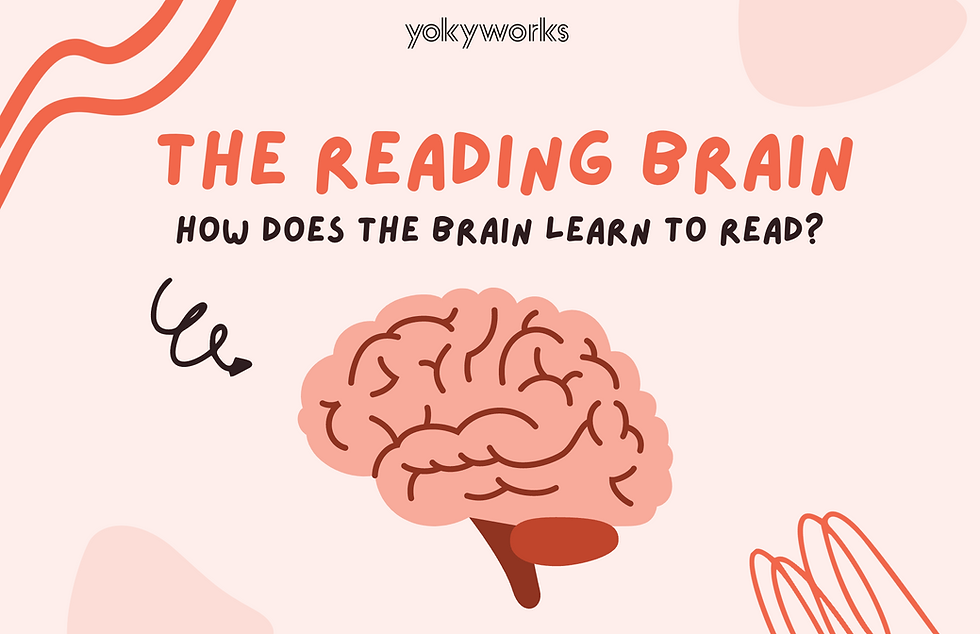Struggling readers don’t have to be reluctant readers
- YokyWorks
- Mar 31, 2021
- 4 min read

As a parent, helping your struggling reader to learn to love books is one of the most important things you can do to ensure that they will become lifelong learners. As any YokyWorks education specialist will tell you, after third grade it becomes increasingly important for children to feel comfortable interacting with print. In elementary school reading becomes a gateway to many other kinds of learning activities, both within and beyond classroom environments. If reading is a challenge for your child, you may be finding it difficult to inspire them to pick up books at all. Fortunately, there are lot’s of strategies you can try in addition to a structured literacy program to help your struggling reader develop positive associations with reading books. Here are some of our favorites:
Leave books around the house for your child to find.
One of the best ways to help your child cultivate a love for reading, even when it’s hard for them, is to place books with intriguing covers in different locations around your home for your child to discover. Provide a variety of choices for them strewn around the house in bathrooms, hallways, and other high-traffic areas of your home. In our experience, children are way more likely to pick up a book if they come across it lying around than if it is tucked away on a bookshelf.
Let your child read what interests them.
Children who love reading associate books with the things they love. One of the easiest ways parents can facilitate this connection is by allowing children to choose books related to their interests. For example, if your child is all about playing Minecraft, you might consider leaving a copy of Minecraft: Maps: An Explorer’s Guide to Minecraft lying around for them to stumble upon. The trick is, once they find it, don’t ask them about it. We know it's hard, but let them tell you about it when they are ready. It’s crucial to keep the pressure off and let their love for reading develop. Research on the effects of reading for pleasure shows that "students who choose what they read and have an informal environment in which to read tend to be more motivated, read more and show greater language and literacy development."
Introduce your child to the wonderful world of audiobooks.
Listening to someone else reading a book allows struggling readers to develop strong connections to stories even if the act of reading is still a challenge. For many children (and adults), listening to audiobooks helps them stay motivated to improve their reading skills and gives them the opportunity to engage with stories while giving their brains a break from processing written words. Giving your children audiobooks to listen to can be a great option if you are short on time. Even better, research has shown that listening to audiobooks can help developing readers bridge the gap between decoding words and assigning meaning. According to this masters thesis on the subject, "The benefits to emergent readers are remarkable, including increases in fluency, vocabulary, phonemic awareness, and confidence."
Give struggling readers access to books in multiple formats.
One of the most effective ways to inspire your child to practice their reading skills is to give them access to books in both printed and audio formats. Having multiple ways of engaging with the same text means they can switch between reading and listening or even listen and read simultaneously. Fortunately, because most libraries increasingly have large collections of digital audiobooks, borrowing books in multiple formats is easier than ever. Check out Libby to see what audiobooks (and ebooks!) your local library has to offer.
Do fun activities inspired by the books you are reading together.
When you read a book with your child or listen to an audiobook together during car rides, plan activities that help bring these books to life. If you’re listening to The Lightning Thief by Rick Riordan, you could make the main character’s favorite blue chocolate chip cookies together and watch this 2010 adaptation. Discussing the similarities and differences with you after seeing the movie will help your child to appreciate the richness and complexity that books can offer their readers.
Let your child see you reading for pleasure.
Show your struggling reader your own love for books by letting them see you reading for pleasure. An influential study published in the Journal of Adolescent and Adult Literacy reveals that students who feel drawn to reading for pleasure see themselves as "members of a community of readers who interact socially around books and share a love of reading with at least one family member." We know that especially lately you may have very little time for reading of your own, but even sitting in the same room as your child with an interesting book in your hands will help them create positive associations with reading.
We hope that strategies can help to strengthen your struggling reader's attachment to books, especially during their time in a structured literacy program. Give one of them a try and let us know what you think!
*YokyWorks is a Bookshop.org affiliate and will earn a small commission if you purchase books linked in this post through our affiliate site.




Comments